MGBBT0UCT: Consumer Behavior Theories and Practical Implications
VerifiedAdded on 2023/06/08
|8
|2293
|400
Essay
AI Summary
This essay explores various aspects of understanding customers, including contemporary perspectives on consumption, individual decision-making processes, the importance of perceptual processes, and the role of consumers in society. It discusses theories of value, involvement levels in decision-making, and the impact of consumer culture. The report also highlights future trends in consumer behavior, such as increased demand for transparency and accelerated online buying. The analysis emphasizes the significance of understanding customer perceptions, tastes, and preferences for enhancing sales and fostering strong customer relationships. This document is available on Desklib, a platform offering a wealth of study resources including past papers and solved assignments.
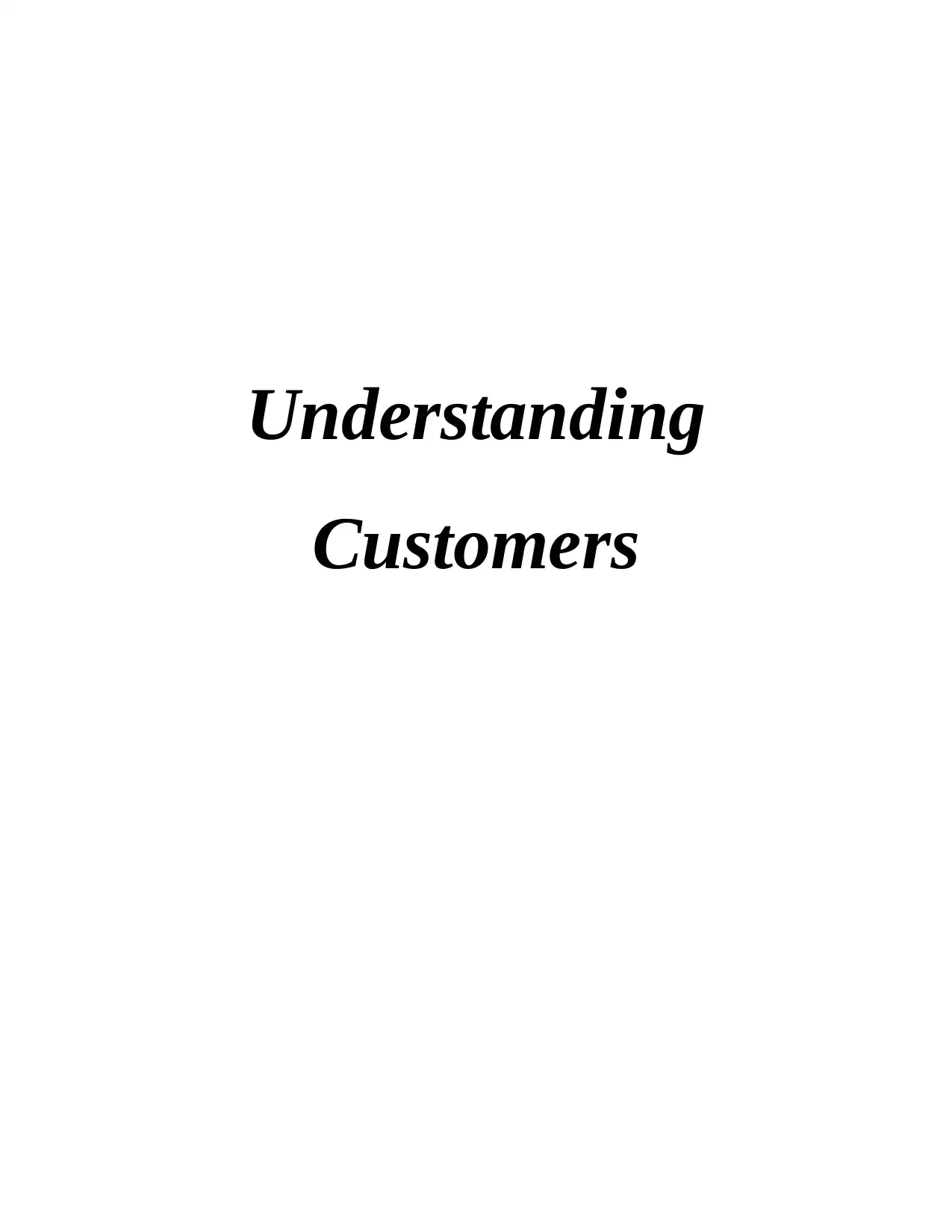
Understanding
Customers
Customers
Paraphrase This Document
Need a fresh take? Get an instant paraphrase of this document with our AI Paraphraser
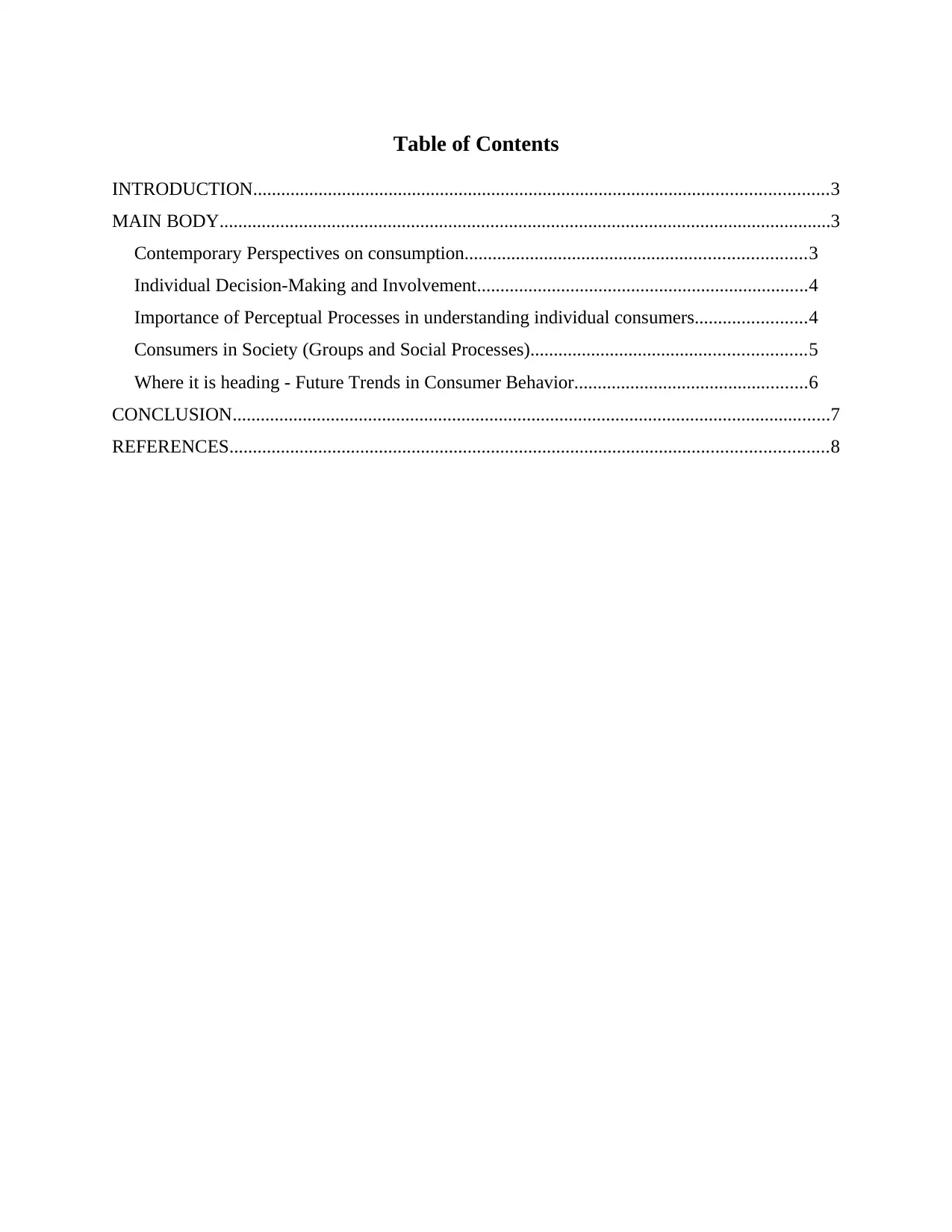
Table of Contents
INTRODUCTION...........................................................................................................................3
MAIN BODY...................................................................................................................................3
Contemporary Perspectives on consumption.........................................................................3
Individual Decision-Making and Involvement.......................................................................4
Importance of Perceptual Processes in understanding individual consumers........................4
Consumers in Society (Groups and Social Processes)...........................................................5
Where it is heading - Future Trends in Consumer Behavior..................................................6
CONCLUSION................................................................................................................................7
REFERENCES................................................................................................................................8
INTRODUCTION...........................................................................................................................3
MAIN BODY...................................................................................................................................3
Contemporary Perspectives on consumption.........................................................................3
Individual Decision-Making and Involvement.......................................................................4
Importance of Perceptual Processes in understanding individual consumers........................4
Consumers in Society (Groups and Social Processes)...........................................................5
Where it is heading - Future Trends in Consumer Behavior..................................................6
CONCLUSION................................................................................................................................7
REFERENCES................................................................................................................................8
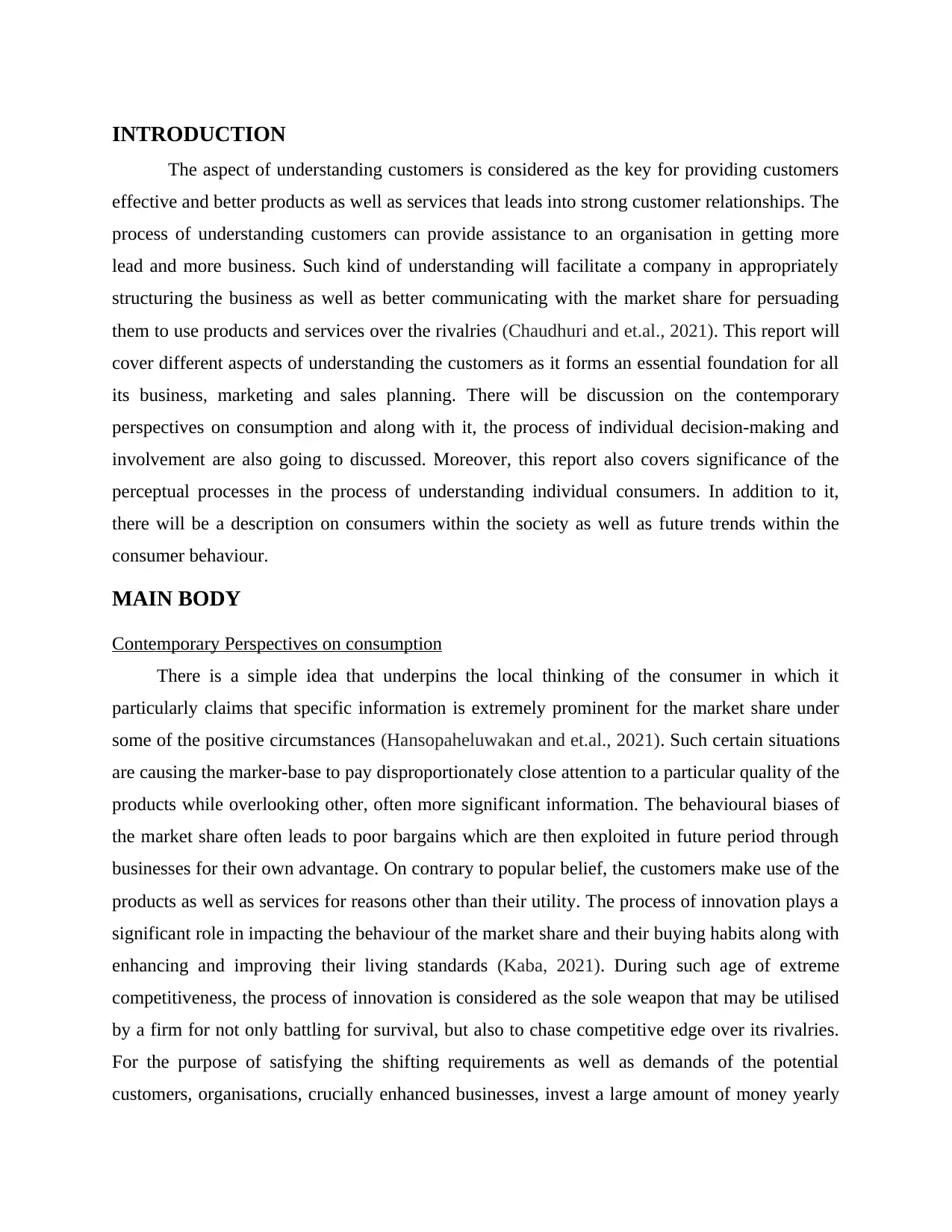
INTRODUCTION
The aspect of understanding customers is considered as the key for providing customers
effective and better products as well as services that leads into strong customer relationships. The
process of understanding customers can provide assistance to an organisation in getting more
lead and more business. Such kind of understanding will facilitate a company in appropriately
structuring the business as well as better communicating with the market share for persuading
them to use products and services over the rivalries (Chaudhuri and et.al., 2021). This report will
cover different aspects of understanding the customers as it forms an essential foundation for all
its business, marketing and sales planning. There will be discussion on the contemporary
perspectives on consumption and along with it, the process of individual decision-making and
involvement are also going to discussed. Moreover, this report also covers significance of the
perceptual processes in the process of understanding individual consumers. In addition to it,
there will be a description on consumers within the society as well as future trends within the
consumer behaviour.
MAIN BODY
Contemporary Perspectives on consumption
There is a simple idea that underpins the local thinking of the consumer in which it
particularly claims that specific information is extremely prominent for the market share under
some of the positive circumstances (Hansopaheluwakan and et.al., 2021). Such certain situations
are causing the marker-base to pay disproportionately close attention to a particular quality of the
products while overlooking other, often more significant information. The behavioural biases of
the market share often leads to poor bargains which are then exploited in future period through
businesses for their own advantage. On contrary to popular belief, the customers make use of the
products as well as services for reasons other than their utility. The process of innovation plays a
significant role in impacting the behaviour of the market share and their buying habits along with
enhancing and improving their living standards (Kaba, 2021). During such age of extreme
competitiveness, the process of innovation is considered as the sole weapon that may be utilised
by a firm for not only battling for survival, but also to chase competitive edge over its rivalries.
For the purpose of satisfying the shifting requirements as well as demands of the potential
customers, organisations, crucially enhanced businesses, invest a large amount of money yearly
The aspect of understanding customers is considered as the key for providing customers
effective and better products as well as services that leads into strong customer relationships. The
process of understanding customers can provide assistance to an organisation in getting more
lead and more business. Such kind of understanding will facilitate a company in appropriately
structuring the business as well as better communicating with the market share for persuading
them to use products and services over the rivalries (Chaudhuri and et.al., 2021). This report will
cover different aspects of understanding the customers as it forms an essential foundation for all
its business, marketing and sales planning. There will be discussion on the contemporary
perspectives on consumption and along with it, the process of individual decision-making and
involvement are also going to discussed. Moreover, this report also covers significance of the
perceptual processes in the process of understanding individual consumers. In addition to it,
there will be a description on consumers within the society as well as future trends within the
consumer behaviour.
MAIN BODY
Contemporary Perspectives on consumption
There is a simple idea that underpins the local thinking of the consumer in which it
particularly claims that specific information is extremely prominent for the market share under
some of the positive circumstances (Hansopaheluwakan and et.al., 2021). Such certain situations
are causing the marker-base to pay disproportionately close attention to a particular quality of the
products while overlooking other, often more significant information. The behavioural biases of
the market share often leads to poor bargains which are then exploited in future period through
businesses for their own advantage. On contrary to popular belief, the customers make use of the
products as well as services for reasons other than their utility. The process of innovation plays a
significant role in impacting the behaviour of the market share and their buying habits along with
enhancing and improving their living standards (Kaba, 2021). During such age of extreme
competitiveness, the process of innovation is considered as the sole weapon that may be utilised
by a firm for not only battling for survival, but also to chase competitive edge over its rivalries.
For the purpose of satisfying the shifting requirements as well as demands of the potential
customers, organisations, crucially enhanced businesses, invest a large amount of money yearly
⊘ This is a preview!⊘
Do you want full access?
Subscribe today to unlock all pages.

Trusted by 1+ million students worldwide
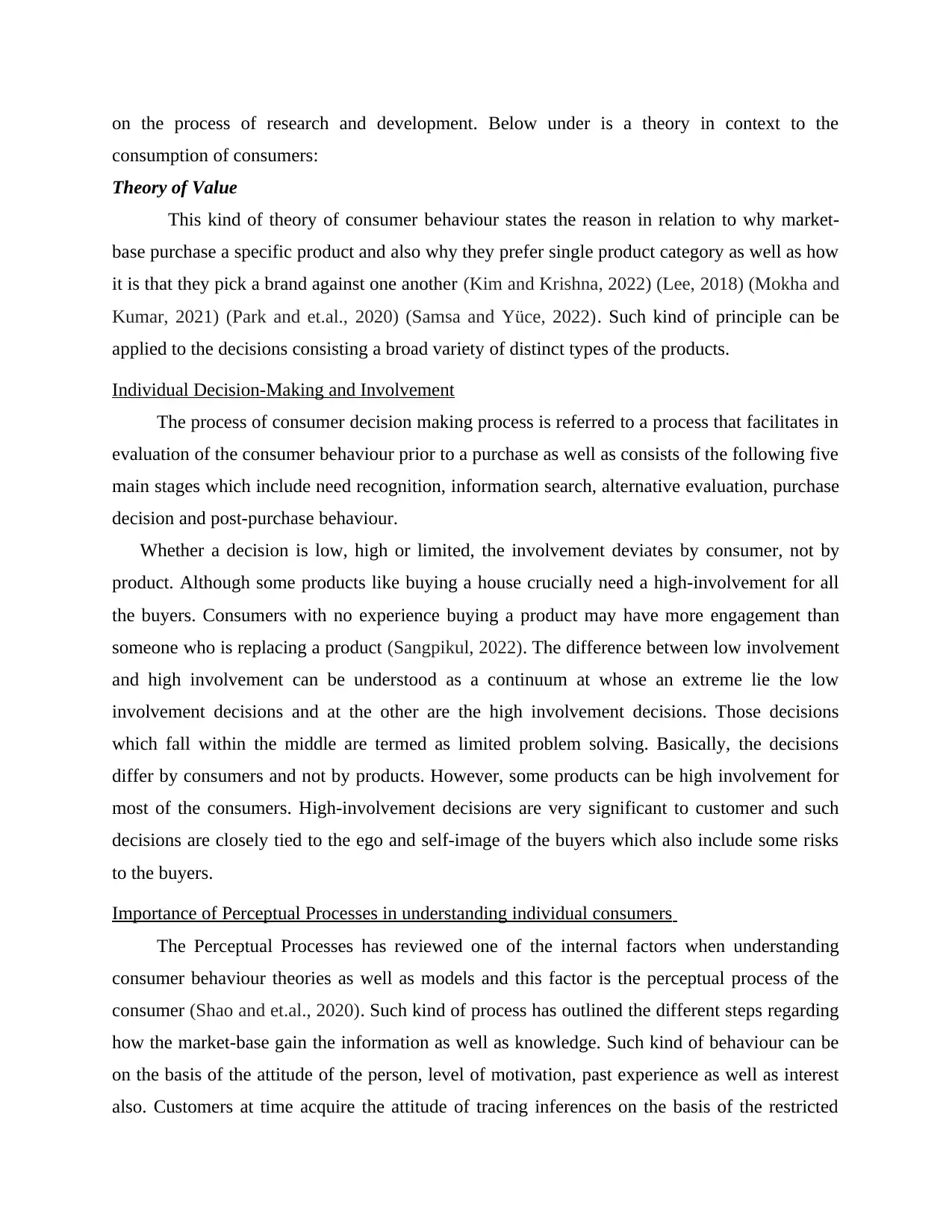
on the process of research and development. Below under is a theory in context to the
consumption of consumers:
Theory of Value
This kind of theory of consumer behaviour states the reason in relation to why market-
base purchase a specific product and also why they prefer single product category as well as how
it is that they pick a brand against one another (Kim and Krishna, 2022) (Lee, 2018) (Mokha and
Kumar, 2021) (Park and et.al., 2020) (Samsa and Yüce, 2022). Such kind of principle can be
applied to the decisions consisting a broad variety of distinct types of the products.
Individual Decision-Making and Involvement
The process of consumer decision making process is referred to a process that facilitates in
evaluation of the consumer behaviour prior to a purchase as well as consists of the following five
main stages which include need recognition, information search, alternative evaluation, purchase
decision and post-purchase behaviour.
Whether a decision is low, high or limited, the involvement deviates by consumer, not by
product. Although some products like buying a house crucially need a high-involvement for all
the buyers. Consumers with no experience buying a product may have more engagement than
someone who is replacing a product (Sangpikul, 2022). The difference between low involvement
and high involvement can be understood as a continuum at whose an extreme lie the low
involvement decisions and at the other are the high involvement decisions. Those decisions
which fall within the middle are termed as limited problem solving. Basically, the decisions
differ by consumers and not by products. However, some products can be high involvement for
most of the consumers. High-involvement decisions are very significant to customer and such
decisions are closely tied to the ego and self-image of the buyers which also include some risks
to the buyers.
Importance of Perceptual Processes in understanding individual consumers
The Perceptual Processes has reviewed one of the internal factors when understanding
consumer behaviour theories as well as models and this factor is the perceptual process of the
consumer (Shao and et.al., 2020). Such kind of process has outlined the different steps regarding
how the market-base gain the information as well as knowledge. Such kind of behaviour can be
on the basis of the attitude of the person, level of motivation, past experience as well as interest
also. Customers at time acquire the attitude of tracing inferences on the basis of the restricted
consumption of consumers:
Theory of Value
This kind of theory of consumer behaviour states the reason in relation to why market-
base purchase a specific product and also why they prefer single product category as well as how
it is that they pick a brand against one another (Kim and Krishna, 2022) (Lee, 2018) (Mokha and
Kumar, 2021) (Park and et.al., 2020) (Samsa and Yüce, 2022). Such kind of principle can be
applied to the decisions consisting a broad variety of distinct types of the products.
Individual Decision-Making and Involvement
The process of consumer decision making process is referred to a process that facilitates in
evaluation of the consumer behaviour prior to a purchase as well as consists of the following five
main stages which include need recognition, information search, alternative evaluation, purchase
decision and post-purchase behaviour.
Whether a decision is low, high or limited, the involvement deviates by consumer, not by
product. Although some products like buying a house crucially need a high-involvement for all
the buyers. Consumers with no experience buying a product may have more engagement than
someone who is replacing a product (Sangpikul, 2022). The difference between low involvement
and high involvement can be understood as a continuum at whose an extreme lie the low
involvement decisions and at the other are the high involvement decisions. Those decisions
which fall within the middle are termed as limited problem solving. Basically, the decisions
differ by consumers and not by products. However, some products can be high involvement for
most of the consumers. High-involvement decisions are very significant to customer and such
decisions are closely tied to the ego and self-image of the buyers which also include some risks
to the buyers.
Importance of Perceptual Processes in understanding individual consumers
The Perceptual Processes has reviewed one of the internal factors when understanding
consumer behaviour theories as well as models and this factor is the perceptual process of the
consumer (Shao and et.al., 2020). Such kind of process has outlined the different steps regarding
how the market-base gain the information as well as knowledge. Such kind of behaviour can be
on the basis of the attitude of the person, level of motivation, past experience as well as interest
also. Customers at time acquire the attitude of tracing inferences on the basis of the restricted
Paraphrase This Document
Need a fresh take? Get an instant paraphrase of this document with our AI Paraphraser
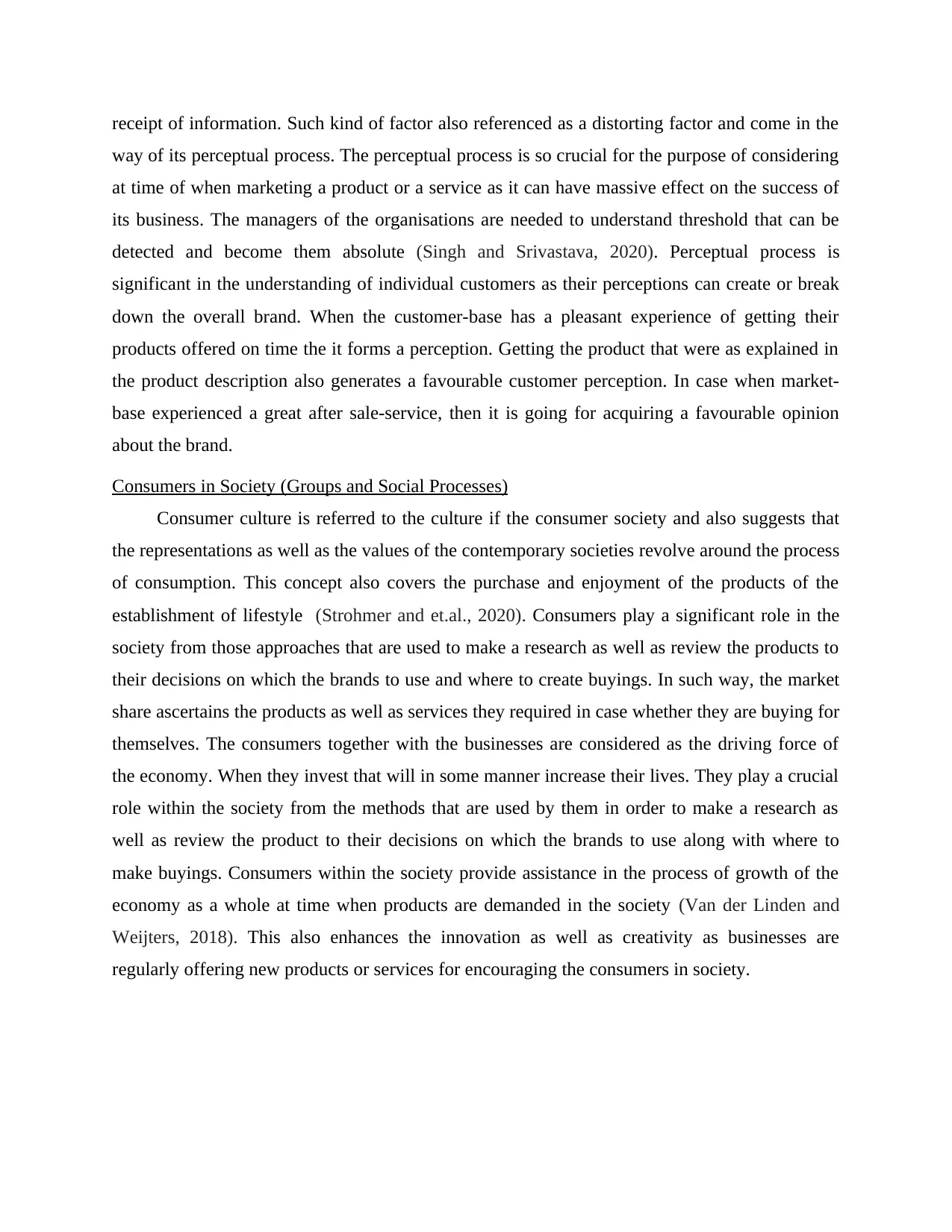
receipt of information. Such kind of factor also referenced as a distorting factor and come in the
way of its perceptual process. The perceptual process is so crucial for the purpose of considering
at time of when marketing a product or a service as it can have massive effect on the success of
its business. The managers of the organisations are needed to understand threshold that can be
detected and become them absolute (Singh and Srivastava, 2020). Perceptual process is
significant in the understanding of individual customers as their perceptions can create or break
down the overall brand. When the customer-base has a pleasant experience of getting their
products offered on time the it forms a perception. Getting the product that were as explained in
the product description also generates a favourable customer perception. In case when market-
base experienced a great after sale-service, then it is going for acquiring a favourable opinion
about the brand.
Consumers in Society (Groups and Social Processes)
Consumer culture is referred to the culture if the consumer society and also suggests that
the representations as well as the values of the contemporary societies revolve around the process
of consumption. This concept also covers the purchase and enjoyment of the products of the
establishment of lifestyle (Strohmer and et.al., 2020). Consumers play a significant role in the
society from those approaches that are used to make a research as well as review the products to
their decisions on which the brands to use and where to create buyings. In such way, the market
share ascertains the products as well as services they required in case whether they are buying for
themselves. The consumers together with the businesses are considered as the driving force of
the economy. When they invest that will in some manner increase their lives. They play a crucial
role within the society from the methods that are used by them in order to make a research as
well as review the product to their decisions on which the brands to use along with where to
make buyings. Consumers within the society provide assistance in the process of growth of the
economy as a whole at time when products are demanded in the society (Van der Linden and
Weijters, 2018). This also enhances the innovation as well as creativity as businesses are
regularly offering new products or services for encouraging the consumers in society.
way of its perceptual process. The perceptual process is so crucial for the purpose of considering
at time of when marketing a product or a service as it can have massive effect on the success of
its business. The managers of the organisations are needed to understand threshold that can be
detected and become them absolute (Singh and Srivastava, 2020). Perceptual process is
significant in the understanding of individual customers as their perceptions can create or break
down the overall brand. When the customer-base has a pleasant experience of getting their
products offered on time the it forms a perception. Getting the product that were as explained in
the product description also generates a favourable customer perception. In case when market-
base experienced a great after sale-service, then it is going for acquiring a favourable opinion
about the brand.
Consumers in Society (Groups and Social Processes)
Consumer culture is referred to the culture if the consumer society and also suggests that
the representations as well as the values of the contemporary societies revolve around the process
of consumption. This concept also covers the purchase and enjoyment of the products of the
establishment of lifestyle (Strohmer and et.al., 2020). Consumers play a significant role in the
society from those approaches that are used to make a research as well as review the products to
their decisions on which the brands to use and where to create buyings. In such way, the market
share ascertains the products as well as services they required in case whether they are buying for
themselves. The consumers together with the businesses are considered as the driving force of
the economy. When they invest that will in some manner increase their lives. They play a crucial
role within the society from the methods that are used by them in order to make a research as
well as review the product to their decisions on which the brands to use along with where to
make buyings. Consumers within the society provide assistance in the process of growth of the
economy as a whole at time when products are demanded in the society (Van der Linden and
Weijters, 2018). This also enhances the innovation as well as creativity as businesses are
regularly offering new products or services for encouraging the consumers in society.
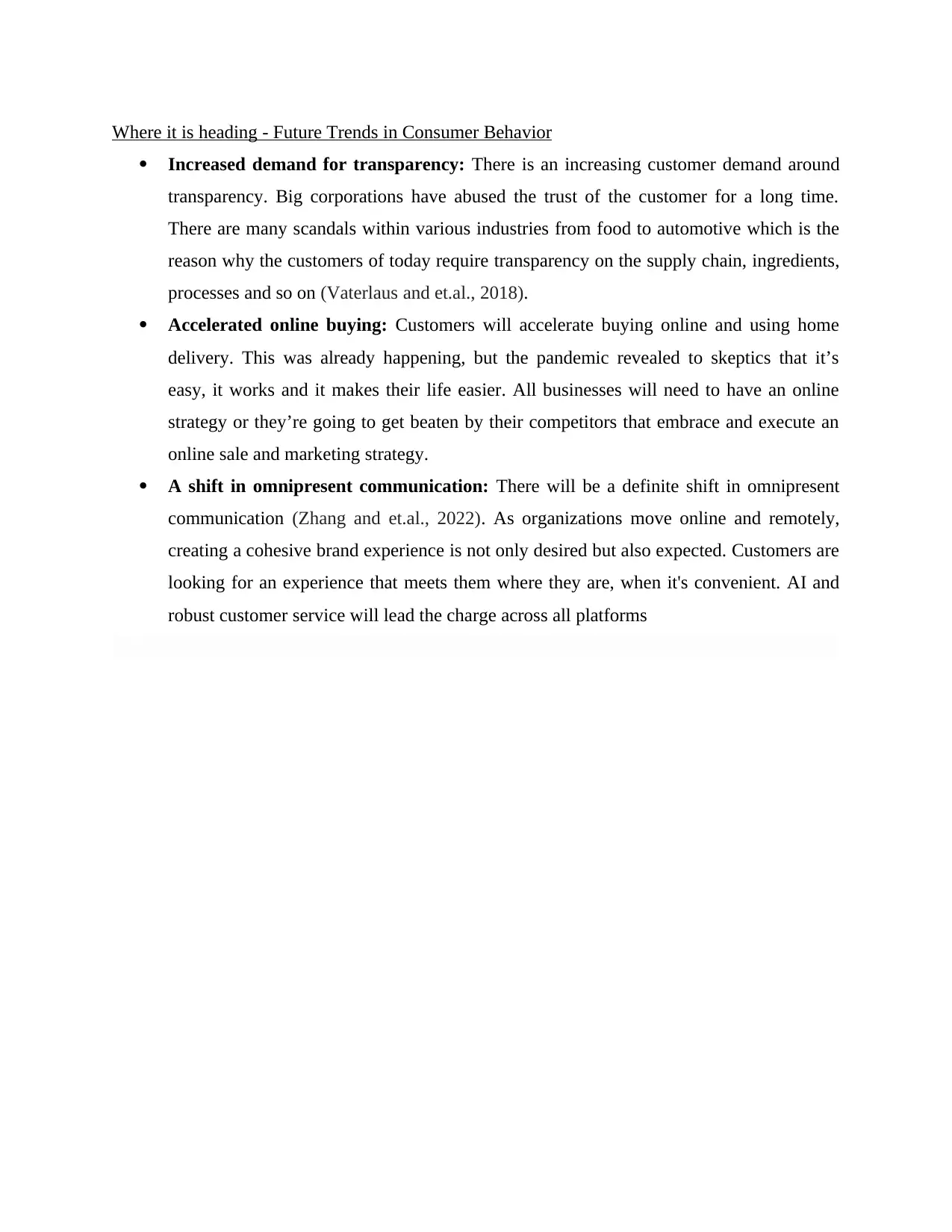
Where it is heading - Future Trends in Consumer Behavior
Increased demand for transparency: There is an increasing customer demand around
transparency. Big corporations have abused the trust of the customer for a long time.
There are many scandals within various industries from food to automotive which is the
reason why the customers of today require transparency on the supply chain, ingredients,
processes and so on (Vaterlaus and et.al., 2018).
Accelerated online buying: Customers will accelerate buying online and using home
delivery. This was already happening, but the pandemic revealed to skeptics that it’s
easy, it works and it makes their life easier. All businesses will need to have an online
strategy or they’re going to get beaten by their competitors that embrace and execute an
online sale and marketing strategy.
A shift in omnipresent communication: There will be a definite shift in omnipresent
communication (Zhang and et.al., 2022). As organizations move online and remotely,
creating a cohesive brand experience is not only desired but also expected. Customers are
looking for an experience that meets them where they are, when it's convenient. AI and
robust customer service will lead the charge across all platforms
Increased demand for transparency: There is an increasing customer demand around
transparency. Big corporations have abused the trust of the customer for a long time.
There are many scandals within various industries from food to automotive which is the
reason why the customers of today require transparency on the supply chain, ingredients,
processes and so on (Vaterlaus and et.al., 2018).
Accelerated online buying: Customers will accelerate buying online and using home
delivery. This was already happening, but the pandemic revealed to skeptics that it’s
easy, it works and it makes their life easier. All businesses will need to have an online
strategy or they’re going to get beaten by their competitors that embrace and execute an
online sale and marketing strategy.
A shift in omnipresent communication: There will be a definite shift in omnipresent
communication (Zhang and et.al., 2022). As organizations move online and remotely,
creating a cohesive brand experience is not only desired but also expected. Customers are
looking for an experience that meets them where they are, when it's convenient. AI and
robust customer service will lead the charge across all platforms
⊘ This is a preview!⊘
Do you want full access?
Subscribe today to unlock all pages.

Trusted by 1+ million students worldwide
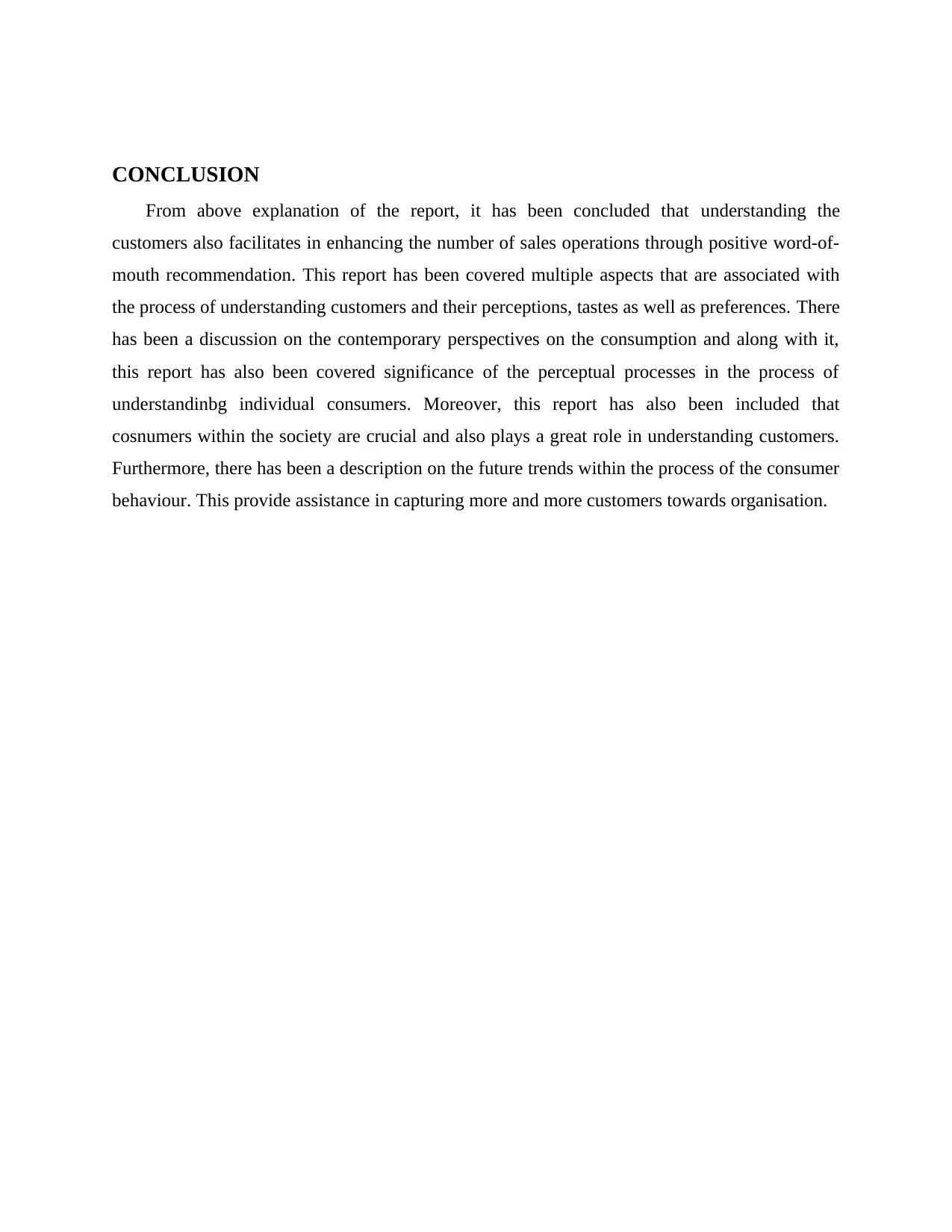
CONCLUSION
From above explanation of the report, it has been concluded that understanding the
customers also facilitates in enhancing the number of sales operations through positive word-of-
mouth recommendation. This report has been covered multiple aspects that are associated with
the process of understanding customers and their perceptions, tastes as well as preferences. There
has been a discussion on the contemporary perspectives on the consumption and along with it,
this report has also been covered significance of the perceptual processes in the process of
understandinbg individual consumers. Moreover, this report has also been included that
cosnumers within the society are crucial and also plays a great role in understanding customers.
Furthermore, there has been a description on the future trends within the process of the consumer
behaviour. This provide assistance in capturing more and more customers towards organisation.
From above explanation of the report, it has been concluded that understanding the
customers also facilitates in enhancing the number of sales operations through positive word-of-
mouth recommendation. This report has been covered multiple aspects that are associated with
the process of understanding customers and their perceptions, tastes as well as preferences. There
has been a discussion on the contemporary perspectives on the consumption and along with it,
this report has also been covered significance of the perceptual processes in the process of
understandinbg individual consumers. Moreover, this report has also been included that
cosnumers within the society are crucial and also plays a great role in understanding customers.
Furthermore, there has been a description on the future trends within the process of the consumer
behaviour. This provide assistance in capturing more and more customers towards organisation.
Paraphrase This Document
Need a fresh take? Get an instant paraphrase of this document with our AI Paraphraser
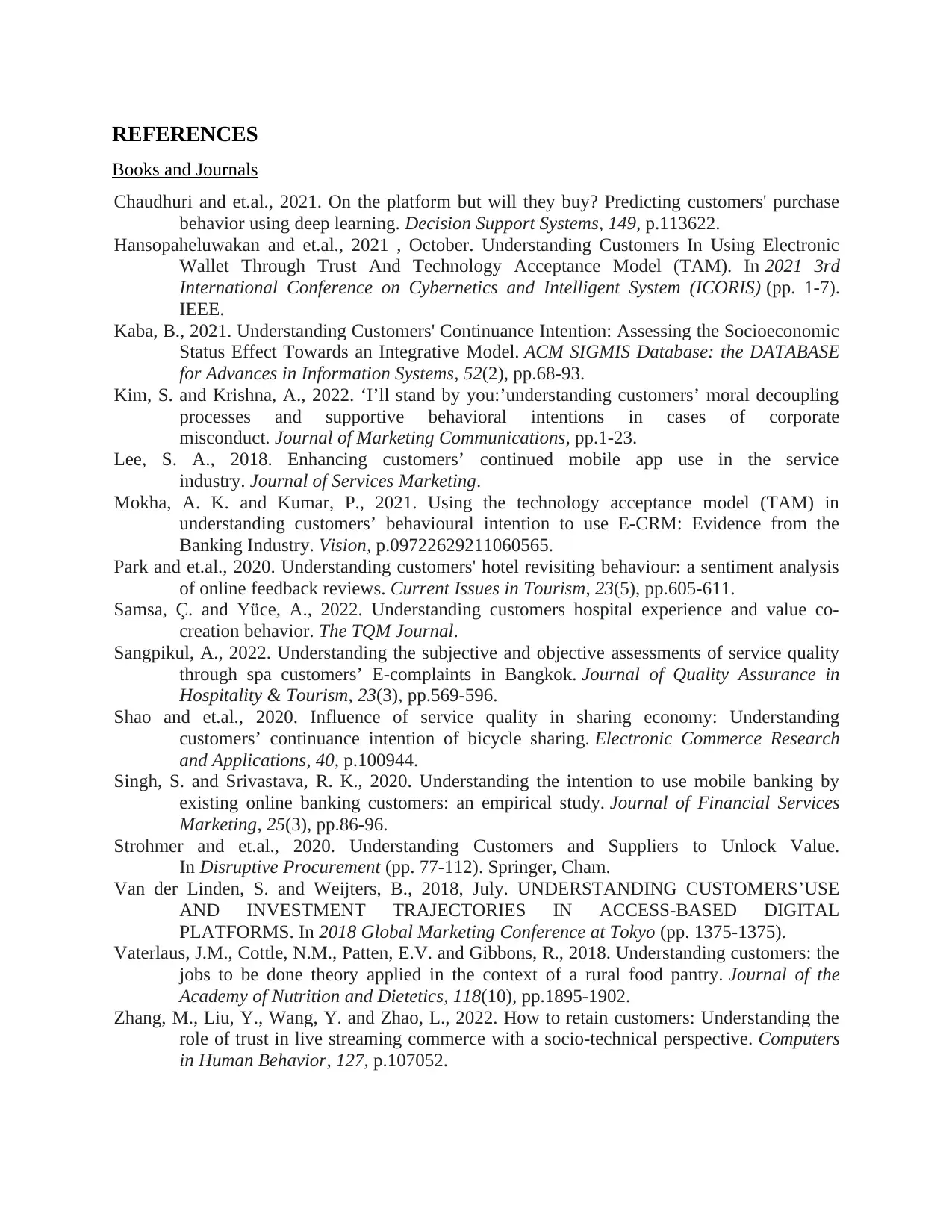
REFERENCES
Books and Journals
Chaudhuri and et.al., 2021. On the platform but will they buy? Predicting customers' purchase
behavior using deep learning. Decision Support Systems, 149, p.113622.
Hansopaheluwakan and et.al., 2021 , October. Understanding Customers In Using Electronic
Wallet Through Trust And Technology Acceptance Model (TAM). In 2021 3rd
International Conference on Cybernetics and Intelligent System (ICORIS) (pp. 1-7).
IEEE.
Kaba, B., 2021. Understanding Customers' Continuance Intention: Assessing the Socioeconomic
Status Effect Towards an Integrative Model. ACM SIGMIS Database: the DATABASE
for Advances in Information Systems, 52(2), pp.68-93.
Kim, S. and Krishna, A., 2022. ‘I’ll stand by you:’understanding customers’ moral decoupling
processes and supportive behavioral intentions in cases of corporate
misconduct. Journal of Marketing Communications, pp.1-23.
Lee, S. A., 2018. Enhancing customers’ continued mobile app use in the service
industry. Journal of Services Marketing.
Mokha, A. K. and Kumar, P., 2021. Using the technology acceptance model (TAM) in
understanding customers’ behavioural intention to use E-CRM: Evidence from the
Banking Industry. Vision, p.09722629211060565.
Park and et.al., 2020. Understanding customers' hotel revisiting behaviour: a sentiment analysis
of online feedback reviews. Current Issues in Tourism, 23(5), pp.605-611.
Samsa, Ç. and Yüce, A., 2022. Understanding customers hospital experience and value co-
creation behavior. The TQM Journal.
Sangpikul, A., 2022. Understanding the subjective and objective assessments of service quality
through spa customers’ E-complaints in Bangkok. Journal of Quality Assurance in
Hospitality & Tourism, 23(3), pp.569-596.
Shao and et.al., 2020. Influence of service quality in sharing economy: Understanding
customers’ continuance intention of bicycle sharing. Electronic Commerce Research
and Applications, 40, p.100944.
Singh, S. and Srivastava, R. K., 2020. Understanding the intention to use mobile banking by
existing online banking customers: an empirical study. Journal of Financial Services
Marketing, 25(3), pp.86-96.
Strohmer and et.al., 2020. Understanding Customers and Suppliers to Unlock Value.
In Disruptive Procurement (pp. 77-112). Springer, Cham.
Van der Linden, S. and Weijters, B., 2018, July. UNDERSTANDING CUSTOMERS’USE
AND INVESTMENT TRAJECTORIES IN ACCESS-BASED DIGITAL
PLATFORMS. In 2018 Global Marketing Conference at Tokyo (pp. 1375-1375).
Vaterlaus, J.M., Cottle, N.M., Patten, E.V. and Gibbons, R., 2018. Understanding customers: the
jobs to be done theory applied in the context of a rural food pantry. Journal of the
Academy of Nutrition and Dietetics, 118(10), pp.1895-1902.
Zhang, M., Liu, Y., Wang, Y. and Zhao, L., 2022. How to retain customers: Understanding the
role of trust in live streaming commerce with a socio-technical perspective. Computers
in Human Behavior, 127, p.107052.
Books and Journals
Chaudhuri and et.al., 2021. On the platform but will they buy? Predicting customers' purchase
behavior using deep learning. Decision Support Systems, 149, p.113622.
Hansopaheluwakan and et.al., 2021 , October. Understanding Customers In Using Electronic
Wallet Through Trust And Technology Acceptance Model (TAM). In 2021 3rd
International Conference on Cybernetics and Intelligent System (ICORIS) (pp. 1-7).
IEEE.
Kaba, B., 2021. Understanding Customers' Continuance Intention: Assessing the Socioeconomic
Status Effect Towards an Integrative Model. ACM SIGMIS Database: the DATABASE
for Advances in Information Systems, 52(2), pp.68-93.
Kim, S. and Krishna, A., 2022. ‘I’ll stand by you:’understanding customers’ moral decoupling
processes and supportive behavioral intentions in cases of corporate
misconduct. Journal of Marketing Communications, pp.1-23.
Lee, S. A., 2018. Enhancing customers’ continued mobile app use in the service
industry. Journal of Services Marketing.
Mokha, A. K. and Kumar, P., 2021. Using the technology acceptance model (TAM) in
understanding customers’ behavioural intention to use E-CRM: Evidence from the
Banking Industry. Vision, p.09722629211060565.
Park and et.al., 2020. Understanding customers' hotel revisiting behaviour: a sentiment analysis
of online feedback reviews. Current Issues in Tourism, 23(5), pp.605-611.
Samsa, Ç. and Yüce, A., 2022. Understanding customers hospital experience and value co-
creation behavior. The TQM Journal.
Sangpikul, A., 2022. Understanding the subjective and objective assessments of service quality
through spa customers’ E-complaints in Bangkok. Journal of Quality Assurance in
Hospitality & Tourism, 23(3), pp.569-596.
Shao and et.al., 2020. Influence of service quality in sharing economy: Understanding
customers’ continuance intention of bicycle sharing. Electronic Commerce Research
and Applications, 40, p.100944.
Singh, S. and Srivastava, R. K., 2020. Understanding the intention to use mobile banking by
existing online banking customers: an empirical study. Journal of Financial Services
Marketing, 25(3), pp.86-96.
Strohmer and et.al., 2020. Understanding Customers and Suppliers to Unlock Value.
In Disruptive Procurement (pp. 77-112). Springer, Cham.
Van der Linden, S. and Weijters, B., 2018, July. UNDERSTANDING CUSTOMERS’USE
AND INVESTMENT TRAJECTORIES IN ACCESS-BASED DIGITAL
PLATFORMS. In 2018 Global Marketing Conference at Tokyo (pp. 1375-1375).
Vaterlaus, J.M., Cottle, N.M., Patten, E.V. and Gibbons, R., 2018. Understanding customers: the
jobs to be done theory applied in the context of a rural food pantry. Journal of the
Academy of Nutrition and Dietetics, 118(10), pp.1895-1902.
Zhang, M., Liu, Y., Wang, Y. and Zhao, L., 2022. How to retain customers: Understanding the
role of trust in live streaming commerce with a socio-technical perspective. Computers
in Human Behavior, 127, p.107052.
1 out of 8
Related Documents
Your All-in-One AI-Powered Toolkit for Academic Success.
+13062052269
info@desklib.com
Available 24*7 on WhatsApp / Email
![[object Object]](/_next/static/media/star-bottom.7253800d.svg)
Unlock your academic potential
Copyright © 2020–2026 A2Z Services. All Rights Reserved. Developed and managed by ZUCOL.




